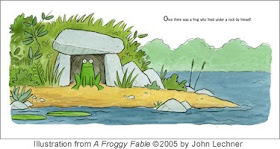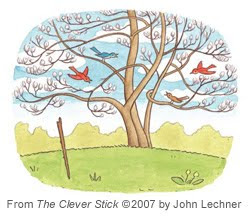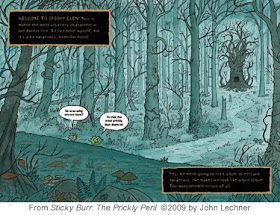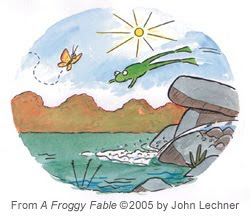How does an illustrator create a world? There are many ways to do this, and every illustrator has their own individual tricks and techniques. Here are a few of the methods I use to create a world in my picture books.

1. Establishing Shot
This is a term often used in filmmaking, but pertains to books as well, and helps create context for your story. In my book A Froggy Fable, the setting and the frog's place in it was very important to the story, so I wanted to establish it early. You don't always need to do this at the beginning of the book, as long as it comes at a point when it's important to the story in order to give continuity to the world.

2. Time of Day/Year
When does your story take place? A specific time of day or season of the year can really help make a world come together. My book The Clever Stick takes place in the springtime. My first Sticky Burr book takes place in the summer and the second one in the autumn, and I tried to draw each scene accordingly.

3. Different Perspectives
Different viewpoints – high/low/near/far – not only add variety to scenes, but allow the viewer to see more of your world, and can heighten the drama. Looking down from above, up from below, or from the viewpoint of your main character, can completely change the flavor of your story. But don't go crazy, try to use perspective where it helps the story.

4. Atmosphere
By atmosphere I mean both the physical and the psychological one – are you depicting a happy scene or a scary one? Giving the viewer an emotional reaction to a scene draws them in and makes them a part of it. In this image from Sticky Burr: The Prickly Peril, I used a limited palette and jagged lines to enhance the mood.

5. Continuity
It's important to make your world and your characters look consistent from page to page. But consistency of style is often even more important than consistency of character. If the overall style of your drawings is consistent from page to page, your world will feel like it all fits together. Style is not easy to develop, and is best when it comes naturally. I find when I focus on the story and climb inside of it, the style follows on its own.
Those are just some of the ways an illustrator can create a tangible and believable world in a picture book. Can you think of others? Leave your suggestions in the comments!
You can learn more about author/illustrator John Lechner at his Illustrator of the Month interview and on his website www.johnlechner.com
Great guest post! Thank you so much for letting us writers see into the world of the illustrator.
ReplyDeleteStephanie
Fascinating! Thanks for sharing. :)
ReplyDelete